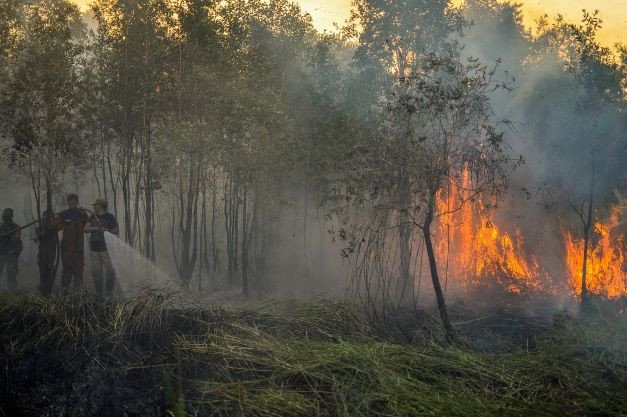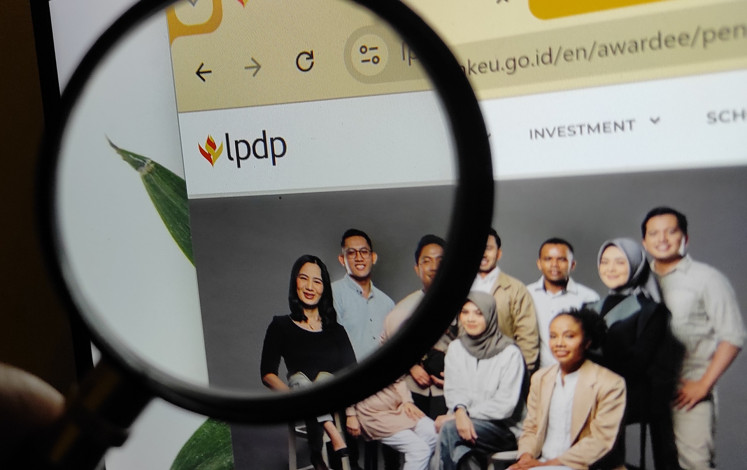Popular Reads
Top Results
Can't find what you're looking for?
View all search resultsPopular Reads
Top Results
Can't find what you're looking for?
View all search resultsWhat COVID-19 has taught us about sustainable choices and climate change
When people stayed home and bought less, our seemingly unachievable climate goals were suddenly not so remote.
Change text size
Gift Premium Articles
to Anyone
T
he pandemic has shown us how we can clean up the planet. Many climate activists and governmental bodies like the Intergovernmental Panel on Climate Change (IPCC) warned that we must reduce emissions so that global warming is limited to 1.5 degrees Celsius.
But actions to limit warming have fallen short of this goal. However, there is hope. In the first half of 2020, global CO2 emissions actually dropped enough to put us on this path, declining by 17 percent in April 2020.
Unfortunately, experts are expecting that we will reach pre-pandemic levels of emissions once again, putting us back on the path of three or more degrees of warming.
Here’s one example that awaits us in the post-pandemic world, revenge travel, sparked by the pent-up demand of many to finally board a plane again. With the first lockdowns, air travel dropped by around 40 percent, preventing 915 million tons of carbon from being emitted which, unfortunately, majorly affected Indonesia’s tourism industry because there are more than 400,000 workers lost their job in 2020, not to mention that the number of international tourists also decreased by 75 percent compared to the previous year.
As borders reopen, spending on tourism and quick-fire flight bookings surge as people try to make up for the perceived lost time. There is a 94 percent of the increasing rate of international tourist arrivals in February 2022 compared to the previous year and the hotel occupancy rate also reached more than 45 percent in March 2022.
We strongly believe that we don’t have to bound back to our old behaviors. There is immense, under-recognized potential for bottom-up behavior change that will help us fight this climate crisis.
Lockdowns due to the pandemic have led to an unprecedented “digital migration” in every aspect of life, work, entertainment, learning, and shopping. When people stayed home and bought less, our seemingly unachievable climate goals were suddenly not so remote.
Research supports this seemingly simple observation. But as we proceed into the new normal, how can we ensure that we are not bringing our most destructive habits back from the dead, too?
First of all, we need to know what spurs these bad habits in the first place. “Mimetic desire”, or making decisions based on the desires of the people around us, has led to runaway overconsumption and the ravaging of the planet. We want more not because we need more, but rather because we are heavily influenced by our social environment.
The rise of new digital media and hyper-targeted advertising techniques further reinforce the idea that well-being comes from material wealth and from owning the latest products. This mindset has to change and that needs to happen now.
At the onset of the pandemic, we saw that dramatic behavior change with a positive impact on the environment is, in fact, possible. So, what if we strive to not return to pre-COVID-19 habits and instead retain some of that more environmentally-friendly life of the past two years?
Take the revenge travel example. Instead of immediately taking the next travel opportunity, consumers can be more aware of their impulses and try to moderate them to avoid further damage to the environment. The potential impact is massive.
Mass consumer behavior change has accomplished far more in less time than international agreements, corporate pledges, or political legislation alone could ever hope to achieve. One could argue that the behavior during the pandemic was the result of mandatory policies that confined people at home and closed businesses.
Then, how can we now encourage people to voluntarily adopt more sustainable consumer behaviors to get closer to the 1.5-degree targets?
There are a few solutions here. NGOs and governments need to meet consumers where they currently are and help make sustainable living an easier, “no-brainer” choice.
Brands must be held accountable for leading customers astray and for pursuing practices that run against a healthy amount of consumption. For politicians and decision-makers, now is the opportunity to implement bipartisan measures which will more organically encourage more sustainable behaviors, even if these imply higher costs.
Indonesia’s government has also committed to achieving net-zero emissions and it is currently on track to reach its 2030 targets, promoting green technologies and alternative low-carbon solutions.
Some of the examples are related to these three ongoing projects: Geothermal Resource Risk Mitigation which potentially reduces 112.2 million tons of carbon dioxide per year with US$410 million; Rapid Bus Transit development in Semarang which is supported by the Green Climate Fund (GCF) fund of $788,000 and able to reduce 210.000 tons of carbon dioxide per year; Climate Investor One, which is a project implemented in 11 countries, including Indonesia with more than $721,5 million funding and is expected to be able to reduce 53.7 million tons of carbon dioxide per year.
Change is predominantly needed in affluent nations, with the top 10 percent accounting for 52 percent of carbon emissions. The rich serve as role models, so it is essential for them to moderate their consumption first. Indonesia, as one of the countries with rapidly developing economies, also has a crucial role to play in reducing carbon emissions.
Keeping environmental considerations in mind during rapid economic growth can have an exponential positive climate impact. We’re not asking people to live in huts, but rather to eliminate the more astounding aspects of their exorbitant lifestyles.
Policy interventions such as raising carbon taxes can deter businesses and individuals from overconsumption, encouraging them to take actions to moderate their emissions. Indonesia also aims to apply a carbon tax policy by July 2022 with a view to generate around Rp4 trillion (over $270 million) of tax revenue.
We need a dramatically different vision for this world and our society if we are to save our planet. The world we are aiming for is one in which we engage in much less business travel and have fewer things that last a long time.
It’s a world in which our homes and cars have been “right-sized” and where we eat less and waste less food. In this world, most things that can be digitized are digitized, and we realize that physical proximity is no longer the key requirement to getting to know people in faraway lands. It’s a world in which we spend more time in our own locality, neighborhood, or city.
Our role models are folks who want to build this kind of world. We need to get there if we are to avoid climate catastrophe.
***
The writer is founder and managing partner at Amasia.











